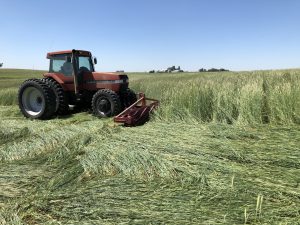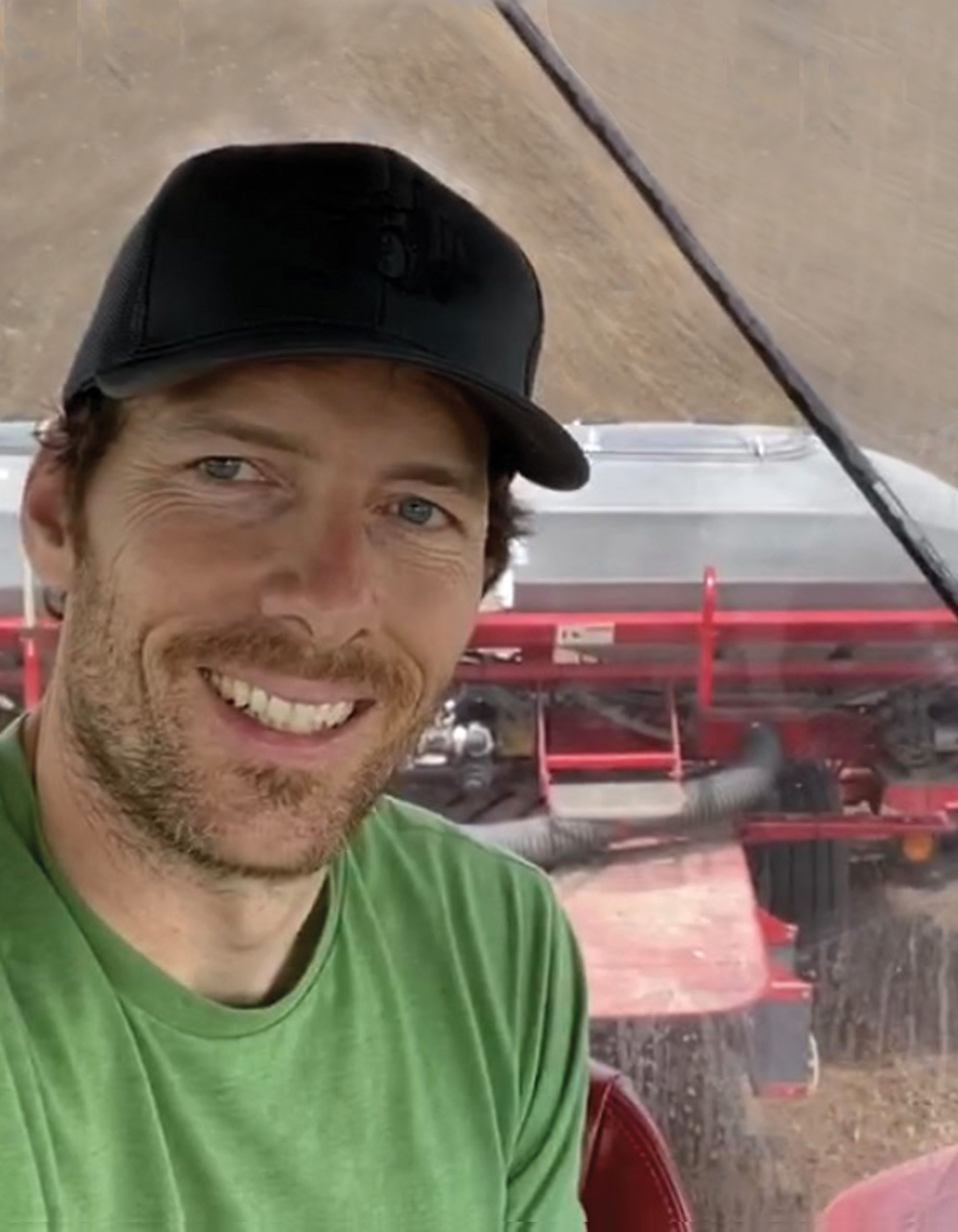The longer I farm the more I find
I’ve got weeds of every kind.
Hit ‘em with Roundup—chemical blast
At first, they died but it did not last.
Hit ‘em a second time at a double rate
Now food smells of glyphosate on my plate.
I’m sick of poison, the bitter taste.
You can’t beat nature at her own race.
–Levi Lyle, from his book of poetry, Ice Sage: Living and Loving the Land
Levi Lyle is a sixth-generation farmer and a poet in Keota, Iowa. Like most Iowa farmers, he grows corn and soybeans. But the similarities end there. Levi is transitioning some of his family’s land to organic and has adopted regenerative agriculture practices on the rest of the farm. As a poet, Levi shares his experiences as a farmer, and offers a call to action for regenerating farming and rural communities.
Transitioning to organic
Levi’s main inspiration to transition 60 acres of his family’s farm to organic was his father, Trent, also a farmer. Trent had suffered from stage 4 lung cancer, which appears to have been caused by his exposure to agricultural chemicals.
“There’s much we know about toxicity we add to our fields and so much we don’t know,” Levi said in an interview with Iowa Farmer Today in 2017.
Fortunately, Trent overcame his illness and still farms.
Levi says his own health challenges from the physical beating he took playing college football was also a motivating factor to going organic.
“It’s my belief that you have to produce healthy food if you want to be healthy,” he says. “I’m putting into practice what I preach.”
Better farm economics was another deciding factor to transition. “It has to do with accessing a premium market where it’s difficult to be profitable on the conventional (farming) side,” he says.
But it’s about more than profit. “It’s got to be about sustaining a community and creating a more balanced relationship with the land,” Levi says.
Levi’s certified organic 60 acres is planted with organic soybeans this year. He plans to sell his soybeans to Professional Proteins, an organic soybean processor in nearby Washington, Iowa.
Levi would like to transition the rest of the land that he and his father farm, which is more than 500 acres, but is limited because they rent most of that land, and the owners may not want it converted to organic.
Roller crimping cover crops eliminates need for herbicides
Levi practices no-till organic farming, which is challenging. Organic rules prohibit organic farmers from using synthetic herbicides to control weeds so most of them will till or plow their soil for weed control. Instead, Levi plants cover crops such as cereal rye and then flattens and kills them using a roller crimper, a wide cylinder with thick blades that attaches to the front of his tractor. The flattened cover crop creates a thick mulch that suppresses weeds, and Levi then plants soybeans into the mulched rye.

Levi Lyle roller crimps a rye cover crop
Levi also uses the roller crimper to terminate cover crops grown with his conventionally grown soybeans, thus eliminating the need for herbicides.
“All soybeans should be grown this way,” he says.
Levi has also been able to eliminate the use of expensive genetically modified seeds and plants less expensive non-GMO corn and soybeans instead.
He saves on fuel costs by eliminating several trips across his fields to spray herbicides.
The savings on seed and fuel result in lower production costs and more profit. An analysis by the Soil Health Institute found that Levi increased his farm’s income by $39.28 per acre for corn and $11.33 for soybeans using regenerative practices such as no-till and cover crops.
“New paradigm of agriculture”
In addition to cereal rye, Levi plants hairy vetch, clover varieties, legumes, and Austrian winter peas as cover crops.
He appreciates the value of cover crops, having grown them for the past 10 years, and says he would like to see “mass cover crop adoption.”
“We know what research says about armoring the soil to protect from erosion and leaching nutrients. That will help us shift into a new paradigm of agriculture,” he says.
Levi supports on-farm research and is collaborating on a joint project to perfect no-till organic systems with Iowa State University, University of Wisconsin, and Rodale Institute.
Kathleen Delate, extension organic specialist at Iowa State, says Levi produced a good yield of no-till organic soybeans last year. This year, he is experimenting with no-till organic corn planted after a hairy vetch cover crop, which is challenging.
“The no-till organic corn system is more difficult than the soybeans into rolled rye because it’s easier to kill the rye by rolling than the hairy vetch,” Delate says.
Based on his experience, Levi says regenerative agriculture “is a better system of agriculture, and we will continue to go more and more into that system.”
He says “systems thinking” is required to practice regenerative agriculture. “We need to think of regenerative agriculture as a whole system that isn’t just about sequestering carbon.”
The system, according to Levi, extends to regenerating rural communities. He has seen many small Iowa towns hollowed out by the consequences of industrial agriculture and wants to help reverse that trend.
“Moving toward a culture of regenerative practices”
Levi’s passion for creating a new paradigm of agriculture has inspired him to write about it. Last year, he published a book of poetry, Ice Sage, about his farming journey, and the problems he sees with industrial agriculture. He recently wrote another book, ‘So God Made a Farmer’: A Retrospective on The Living Words of Paul Harvey by an Organic Farmer and plans to write three more.
Iowa is dominated by monoculture crops of GMO corn and soybeans and hog factory farms, and the state faces many challenges with polluted waterways from nitrogen fertilizer runoff and hog manure.
In his writings, Levi addresses the problems, but his message is one of unity, aiming to bring people together and not create divisions. In ‘So God Made a Farmer,’ he writes: “The merit of USDA-certified organic farms in moving toward a culture of regenerative practices need not polarize us. The larger movement farmers will trend toward is one of biological, ecological, and low-input methodology in its many forms.”
He writes about a new vision for agriculture: “The steadfast commitment and pride in the farmers of our nation gives me confidence in our ability to successfully shift our current paradigm of exploitation to a system with greater lasting potential for future generations.”
In his farming practices and eloquent writings, Levi Lyle—along with growing numbers of organic and regenerative farmers—offer hope that a new paradigm of agriculture based on soil health can be realized in Iowa and across the United States. Such a new paradigm promises to help revive rural communities and benefit all Americans with more nutritious food.





